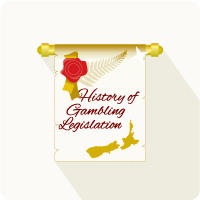The History of New Zealand Gambling Legislation

In New Zealand, gambling is hugely popular and the industry is growing every day. Since 1985, national spending on this industry has increased by over tenfold. Luckily, when it comes to the legality of online gambling, New Zealand has a pretty straightforward approach compared to some other countries around the world. All gambling in NZ is controlled by the Department of Internal Affairs (DIA), which requires all public gambling to return some of its profits to the community.
Most of the gambling industry in NZ is run by state institutions. As for online gambling, the rule is simple. No NZ residents can own, advertise for, or operate an online gambling site, but they are free to join and play at international web casinos. Read on to learn more about NZ's gambling history and how it affects players today.
Types of Gambling
Understand the Gambling Act of 2003 and you?ll understand New Zealand gambling law.
The first kind of gambling to be legislated in NZ was horse betting. In 1920, Bookmaking was banned. From then until the development of the Totalizator Agency Board (TAB) in 1961, citizens could only bet on horse racing while they were on the course at the race itself.
Slot machines, or Pokies, are found outside of land casinos and are a popular way for charitable foundations to raise money. They are usually located in hotels and bars. Pokies are regulated by the Department of Internal Affairs and are allowed only to go up to their prescribed maximum jackpot amounts.
A law was passed in 2009 that requires all Pokies to have Player Information Displays. These show you how long you have been playing and the amount of money spent, and also encourage you to take breaks. This is part of the Department of Internal Affairs' policy that if gambling is to be legal, consumers must be informed of the risks and pitfalls of the industry, and have access to proper resources if they fall victim to a gambling addiction.
Lotteries are also considered regulated legal gambling in NZ. The very first official "Art Union" took place in 1877, organised by the Otago Art Society. Since then, these have been used to raise funds for societies across the nation. In the early days, NZ lottery prizes were small compared with Australian lotteries, encouraging many residents to illegally purchase tickets in the Australian Tattersall Lottery.
In 1950 the Second Labour Government published a study reviewing national lotteries and found that sales were very low. In response, the National Government released the Golden Kiwi Lottery in 1961. Golden Kiwi operated until 1989, when the Instant Kiwi scratch card lottery was introduced.
The NZ government has a special branch dedicated to lotteries, called the New Zealand Lotteries Commission (Lotto NZ). There are four lotteries total, including the weekly Lotto, Big Wednesday, twice daily Keno and Instant Kiwi scratch cards. The Gambling Act of 2003 requires that all players be 18 years or older.
Since all NZ gambling must give back to the community, profits from these lotteries are shared with the New Zealand Lottery Grants Board, which funds organisations working with national sports, arts, and community projects, such as the New Zealand Film Commission, Creative New Zealand and Sport New Zealand. The total amount donated to date is nearly $4 billion.
Of course, we cannot forget land casinos. New Zealand currently has 6 land casinos total, including four SKYCITY casinos in Auckland, Hamilton, Queenstown, and Wharf casino, as well as the Dunedin Casino and Christchurch Casino. To enter a casino, you must be 20 years or older.
Online gambling is strongly regulated in NZ, but only for the owners and operators, not for the consumer. It is completely safe and legal to play at top international online casinos or betting rooms.
The Gambling Act of 2003
NZ gambling laws are designed to direct money back to the community, so gambling is a positive thing for the country.
The biggest piece of legislation affecting online gambling in New Zealand is the Gambling Act of 2003. According to the Department of Internal Affairs the primary concern of this law and the licensure regulations that result from it is that the national community benefits from gambling profits and that the government can minimise the harm done by problem gambling. Community interests are wide reaching, ranging from creative and arts projects to sports organisations, organisations that provide gambling services, or research being done into the social effects of problem gambling.
The Gambling Act of 2003 has the following objectives:
- Control the gambling industry's growth
- Minimise harm done by problem gambling
- Authorise some gambling while prohibiting the rest
- Encourage responsible gambling and limit associated criminal behaviour
- Ensure that games and betting companies are fair
- Ensure that proceeds are donated back to the community
- Allow the community to be involved in decision making regarding the gambling industry
Governmental Agencies That Regulate Gambling
The Department of Internal Affairs
- Writes legislation regarding gambling
- In charge of licensing gambling activities, except casinos
- Prosecutes violators of the law
- Educates the public about the law
The Ministry of Health
- Provides services for problem gamblers and funds these services
- Published the three year plan for Preventing and Minimising Gambling Harm in 2011-2013, as well as a six year strategic plan for 2011-2016
The Gambling Commission
- Handles all licensing for casinos, including new licenses and renewals
- Reviews agreements between casino operators and the casino license holders, including any changes in agreements
- Handles all complaints regarding the way the Department of Internal Affairs handles complaints related to Class 4 gambling
- Specifies as well as revokes conditions for casino licenses
- Advises Ministers on the current situation regarding problem gambling
- Receives and makes decisions on appeals to the Department of Internal Affairs' regulatory and licensing decisions
The New Zealand Lotteries Commission
- Regulates all lotteries in New Zealand
- Passes profits on to the New Zealand Lottery Grants Board
Legislation Timeline
| 1920 | Bookmaking is banned |
| 1961 | Totalizator Agency Board is established |
| 1977 | Gaming and Lotteries Act is passed |
| 1981 | Boxing and Wrestling Act is passed |
| 1990 | Casino Control Act is passed |
| 1991 | Casino Control Regulations are passed regarding Applications and Hours |
| 1992 | Gaming and Lotteries Regulations are established regarding License Fees |
| 1993 | Gaming and Lotteries Prizes Notice is passed |
| 1994 | Casino Control Regulations come about regarding Certificates of Approval and Warrants |
| 1997 | Casino Control (Moratorium) Amendment Act is passed |
| 1998 | Gaming and Lotteries Regulations are passed regarding the Problem Gambling Levy |
| 2000 | Casino Control (Moratorium) Amendment Act is passed |
| 2003 | Gambling Act of 2003 is passed |
| 2003 | Racing Act of 2003 is passed |
| 2005 | Gambling Amendment Act of 2005 is passed |
| 2009 | Player Information Displays (PID) are mandated for all Pokies |




